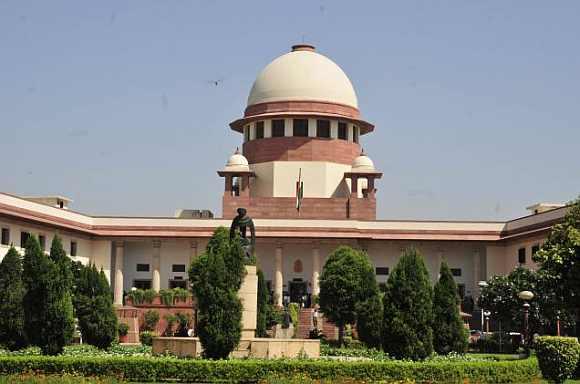 The Supreme Court today refused to revisit its two-decade-old verdict on the anti-defection law holding that an elected or nominated member of Parliament of a political party is bound by its whip even after expulsion.
The Supreme Court today refused to revisit its two-decade-old verdict on the anti-defection law holding that an elected or nominated member of Parliament of a political party is bound by its whip even after expulsion.
“Though we have heard the matter at length, we are not answering the question,” a three-judge bench comprising justices Ranjan Gogoi, P C Pant and Arun Mishra said while disposing of a petition filed by Uttar Pradesh politician Amar Singh and actor-turned-politician Jaya Prada.
The apex court was deciding on the question whether an expelled member could be disqualified under the law, if he or she defies party whip.
The issue had cropped up after Singh and Jaya Prada, who were members of Rajya Sabha and Lok Sabha respectively, had moved the Supreme Court on their expulsion from the Samajwadi Party on February 2, 2010, anticipating ouster from Parliament.
Pyarimohan Mohapatra, who was expelled from Biju Janata Dal, had also moved the apex court on the issue.
“The petitioner MPs have already completed their tenure. It would be more appropriate to not answer the question,” the bench said.
Earlier, the court had reserved the order on the petition seeking to revisit the 1996 verdict on the anti-defection law by which a member elected or nominated by a political party continues to be under its control even after expulsion.
The petitioners had contended that they have landed in a piquant situation as expelled members and apprehended disqualification under the anti-defection law if they chose to defy party’s whip on any issue in Parliament.
The counsel for Singh and Jaya Prada had said the interpretation of the anti-defection law, as per a 1996 ruling of the apex court, does not apply to them as they did not form their own party.
As per the interpretation of the anti-defection law by the Supreme Court in G Vishwanathan case in 1996, a member elected or nominated by a political party continues to be under its control even after his or her expulsion.
The apex court on November 15, 2010, had directed that no action shall be taken against Amar Singh and Jaya Prada under anti-defection law in the event of their defying a party whip.
The two leaders had then sought interim stay on any possible action against them in case they decided to vote in favour of Women’s Reservation Bill to which the SP was fiercely opposed.
Singh has now returned to the SP and was elected to Rajya Sabha recently after being nominated by the party.
The apex court had decided to make the reference while considering that the judgment in the Vishwanathan case was not clear on certain aspects of the anti-defection law.
Earlier, the two leaders had argued that anti-defection law could be invoked only against those who either defect from the party or defy its whip while being in the party.
However, they had contended that in case like theirs, they did not defect from the party but were expelled, and as unattached members, they were not amenable to the party’s whip.
The two MPs had moved the apex court fearing they may be disqualified from Parliament for not abiding by the party whip in view of the apex court 1996 verdict.
They felt the apex court’s interpretation of the Tenth Schedule of the Constitution impinged upon fundamental rights of the expelled members, including their rights to equality, free speech and expression and life under Articles 14, 19 and 21 respectively.





